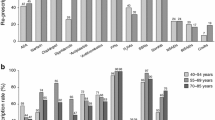Abstract
Background: There has been recent concern regarding a possible adverse interaction between clopidogrel and proton pump inhibitors (PPIs), coupled with uncertainty as to whether PPIs genuinely help in reducing gastrointestinal (GI) harm.
Objective: To perform a meta-analysis of GI outcomes in patients taking clopidogrel, with and without concomitant PPI.
Methods: We searched MEDLINE, EMBASE and the Cochrane Controlled Trials Register from inception to March 2010, and checked conference abstracts for randomized and non-randomized studies that reported on adverse GI events (haemorrhage, ulcer, perforation or obstruction) with PPI exposure in patients taking clopidogrel. Relevant studies were subcategorized according to the degree of aspirin (acetylsalicylic acid) co-administration and nature of GI events, where available. We performed random effects meta-analysis for risk of adverse GI events with PPI exposure in clopidogrel-treated patients, and assessed heterogeneity using the I2 statistic.
Results: Our review evaluated 71 277 participants in nine retrospective studies and one randomized trial. Exposure to PPI for patients receiving dual anti-platelet therapy (aspirin and clopidogrel in seven studies) was associated with a significant reduction in adverse GI events, odds ratio (OR) 0.38 (95% CI 0.21, 0.68; p = 0.001; I2=17%). There was significant heterogeneity in the analysis of patients receiving clopidogrel monotherapy (two studies), and no definite benefit was found. Restricting the analysis to studies specifically reporting upper GI bleeds with any clopidogrel exposure yielded an OR of 0.31 (95% CI 0.19, 0.51; ps<0.001; I2 = 27%) with associated PPI exposure.
Conclusions: Use of PPIs is associated with a reduction in adverse GI events (particularly haemorrhages) in patients who are receiving dual antiplatelet therapy. Clinicians should carefully weigh up the evidence for potential GI benefits against the uncertainties surrounding any possible adverse cardiovascular impact of concomitant clopidogrel PPI therapy.







Similar content being viewed by others
References
Antithrombotic Trialists’ Collaboration. Aspirin in the primary and secondary prevention of vascular disease: collaborative meta-analysis of individual participant data from randomised trials. Lancet 2009; 373: 1849–60
Ho PM, Maddox TM, Wing L, et al. Risk of adverse outcomes associated with concomitant use of clopidogrel and proton pump inhibitors following acute coronary syndrome. JAMA 2009; 301(9): 937–44
Juurlink DN. Proton pump inhibitors and clopidogrel: putting the interaction in perspective. Circulation 2009; 120(23): 2310–2
Rassen JA, Choudhry NK, Avorn J, et al. Cardiovascular outcomes and mortality in patients using clopidogrel with proton pump inhibitors after percutaneous coronary intervention or acute coronary syndrome. Circulation 2009; 120: 2322–9
Ray WA, Murray KT, Griffin MR, et al. Outcomes with concurrent use of clopidogrel and proton-pump inhibitors: a cohort study. Ann Intern Med 2010; 152: 337–45
Kwok CS, Loke YK. Meta-analysis: effects of proton pump inhibitors on cardiovascular events and mortality in patients receiving clopidogrel. Aliment Pharmacol Ther 2010; 31(8): 810–23
Loke YK, Price D, Herxheimer A. Adverse effects. In: Higgins JPT, Green S, editors. Cochrane handbook for systematic reviews of interventions. Chichester: John Wiley & Sons, 2008
Davies HT, Crombie IK, Tavakoli M. When can odds ratios mislead? BMJ 1998; 316(7136): 989–91
Higgins JP, Thompson SG, Deeks JJ, et al. Measuring inconsistency in meta-analyses. BMJ 2003; 327(7414): 557–60
Bhatt DL, Cryer B, Contant CF, et al. COGENT: a prospective, randomized, placebo-controlled trial of omeprazole in patients receiving aspirin and clopidogrel [abstract]. Transvascular Cardiovascular Therapeutics Annual Meeting; 2009 Sep 21–25; San Francisco (CA)
Hokimoto S, Ogawa H. Is it safe to use a proton pump inhibitor with clopidogrel? A comparison of clopidogrel with and without rabeprazole in Japan [abstract no. T1145]. Digestive Disease Week; 2010 May 1–5; New Orleans (LA); T1145
Hsiao FY, Tsai YW, Huang WF, et al. A comparison of aspirin and clopidogrel with or without proton pump inhibitors for the secondary prevention of cardiovascular events in patients at high risk for gastrointestinal bleeding. Clin Ther 2009; 31: 2038–47
Joshi A, Bursey F, Connors S. GI cytoprotection after coronary stenting [abstract no. P0824]. Gastro 2009; 2009 Nov 21–25; London
Lanas A, Garcia-Rodriguez LA, Arroyo MT, et al. Effect of antisecretory drugs and nitrates on the risk of ulcer bleeding associated with nonsteroidal anti-inflammatory drugs, antiplatelet agents and anticoagulants. Investigators of the Asociation Espanola de Gastgroenterologia. Am J Gastroenterol2007; 102: 507–15
Luinstra M, Naunton M, Peterson GM, et al. PPI use in patients commenced on clopidogrel: a retrospective cross-sectional evaluation. J Clin Pharm Ther 2010; 35(2): 213–7
Ng FH, Lam KF, Wong SY, et al. Upper gastrointestinal bleeding in patients with aspirin and clopidogrel cotherapy. Digestion 2008; 77(3–4): 173–7
Rodriguez LAG, Johansson S. Risk of upper gastrointestinal bleeding among users of clopidogrel and low-dose acetylsalicylic acid [abstract no. P1192-154:]. American College of Cardiology Conference; 2010 Mar 14–16; Atlanta (GA)
Yasuda H, Yamada M, Sawada S, et al. Upper gastrointestinal bleeding in patients receiving dual antiplatelet therapy after coronary stenting. Intern Med 2009; 48(19): 1725–30
Straube S, Tramèr MR, Moore RA, et al. Mortality with upper gastrointestinal bleeding and perforation: effects of time and NSAID use. BMC Gastroenterol 2009 Jun 5; 9: 41
Ioannidis JP, Trikalinos TA. The appropriateness of asymmetry tests for publication bias in meta-analyses: a large survey. CMAJ 2007; 176: 1091–6
Acknowledgements
There was no funding source for this study. The authors have no conflicts of interest to declare.
Chun Shing Kwok and Yoon Kong Loke conceptualized the review and developed the protocol. Chun Shing Kwok, Ramanpreet Singh Nijjar and Yoon Kong Loke abstracted and analysed data and wrote the manuscript. Yoon Kong Loke will act as the guarantor for the paper. Additional data was kindly provided by Dr Mark Naunton for one of the included studies.
Author information
Authors and Affiliations
Corresponding author
Rights and permissions
About this article
Cite this article
Kwok, C.S., Nijjar, R.S. & Loke, Y.K. Effects of Proton Pump Inhibitors on Adverse Gastrointestinal Events in Patients Receiving Clopidogrel. Drug-Safety 34, 47–57 (2011). https://doi.org/10.2165/11584750-000000000-00000
Published:
Issue Date:
DOI: https://doi.org/10.2165/11584750-000000000-00000




